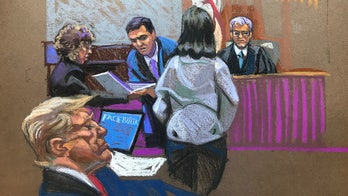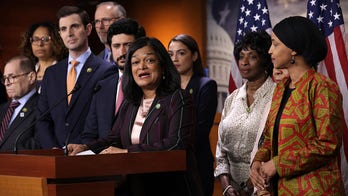Republican opposition is steadily growing against controversial University of California-Berkeley law professor Goodwin Liu, President Obama's nominee for the Ninth Circuit Court of Appeals, potentially imperiling a judicial appointment for the first time in his presidency.
Senior Republicans launched an all-out push to quash the nomination, urging their conference colleagues to support a GOP-led filibuster.
"(Liu's) record reflects a carefully honed and calculated philosophy that he developed and advanced over the course of his brief career in the ivory towers of academia and which threatens the American tradition of limited constitutional government," Sens. Charles Grassley of Iowa, top Republican on the Judiciary Committee, and senior panel member Jeff Sessions of Alabama, wrote in a letter, obtained by Fox News, to their GOP colleagues Wednesday.
In a most ominous sign, former GOP members of the so-called "Gang of 14," who narrowly averted a judicial crisis back in 2005 that nearly shut down the Senate, are lining up against Liu, as well.
The somewhat undefined threshold developed by the bipartisan group back then stated that a nominee should be filibustered only under "extraordinary circumstances."
"The nomination of Mr. Goodwin Liu does rise to a level of 'extraordinary circumstances,' and therefore McCain will seek to filibuster the nomination," read a statement by the office of former gang member John McCain.
In a letter to Judiciary Committee Chairman Patrick Leahy, D-Vt., in 2010 the Arizona Republican cites Liu's writings and indicates the nominee appears to be an activist.
Same goes for McCain's fellow gang member, Sen. Lindsey Graham, R-SC, whose spokesman tells Fox News that Liu is "an idealogue."
The opposition to Liu is multi-pronged, with most Republicans accusing the nominee of wanting to make law, not interpret it. Some view Liu, 40, as too young for a lifetime appointment to the bench, fearing he might soon be propelled to the Supreme Court.
But it is Liu's scathing critique of then-Judge Samuel Alito, President George W. Bush's nominee for the High Court, that appeared to sting the most.
Paralleling the late Sen. Ted Kennedy's dress-down of failed Supreme Court nominee Robert Bork, Liu said in Alito's America "police may shoot and kill an unarmed boy" and "the FBI may install a camera where you sleep," and he went on to say in that America "a black man may be sentenced by an all-white jury for killing a white man absent analysis showing discrimination."
Liu has apologized numerous times for the comments, calling them "inartful," but Republicans have balked.
The nominee, who has endured a rare two confirmation hearings with more than five hours of testimony, enjoys bipartisan support outside Congress, including famed former prosecutor Ken Starr.
Democrats need at least seven Republicans to keep the Liu nomination alive, but their GOP possibilities are fading fast.
According to spokesman Lance Trover, moderate Sen. Mark Kirk, R-Ill., intends to oppose the nomination, including the key test vote Thursday to end the filibuster.
"I'm not going to vote for that," Sen. Johnny Isakson, R-Ga., told Fox News, "It's the perfect definition of 'extraordinary circumstances'. I was here when the confirmation hearings of Judge Alito were going on. You know, I can understand a difference of philosophy, but there should be an evenness of temperament. Judicial temperament, to me, is the most important thing a judge can possess, and I think in that circumstance alone, he demonstrated less than what I would consider appropriate judicial temperament."
Chairman Leahy reminded his colleagues recently that Liu received the highest ranking from the American Bar Association, a unanimous "well qualified," a coveted endorsement in GOP circles that also includes an evaluation of temperament.
In a last ditch attempt to show support, Senate Majority Leader Harry Reid, D-Nev, brought the nominee in for a meeting Wednesday with a handful of Democratic senators and White House Counsel Bob Bauer.
The media were invited in to take pictures, with Reid saying the nominee deserved to be confirmed.
But it does not appear the White House has redoubled its effort at gaining centrist GOP support. Last year, Liu was taken to meet with a number of centrist GOP members, but nothing of the sort appears to have happened in this session of Congress.
Both Sens. Olympia Snowe and Susan Collins of Maine, who remain undecided, said no one in the administration has even contacted them about Liu recently.
Sen. John Thune, a member of GOP leadership who normally votes to end the filibuster of a judicial nominee, told Fox Wednesday that he remains undecided; however, he did ask, rhetorically, "Doesn't this fit the 'extreme circumstances' definition?"
A expert in the area of federal judicial selection, attorney Glenn Sugameli, questioned both Thune and Isakson this time around. "Do Sens. Thune and Isakson think the Constitution has been amended recently to allow filibusters of judicial nominees? They insisted the Constitution requires up or down votes for all judicial nominees in major 2005 Floor speeches, which Sen. Isakson reiterated two weeks ago."
A request for comment from the office of moderate Sen. Scott Brown, R-Mass., a potential "yes" vote, went unanswered.
Though Liu's backers tout his impressive educational credentials, a Yale Law School graduate and Rhodes Scholar, as proof of his intellectual prowess, it remains to be seen if that can convince the small pool of possible GOP supporters to save this nomination.




